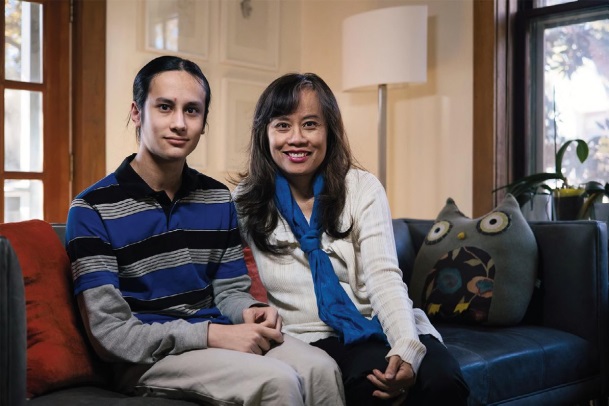WHAT'S HAPPENING
THIS DOCTOR THOUGHT SHE COULD NAVIGATE U.S. HEALTH CARE. THEN HER AUTISTIC SON NEEDED HELP
BY NOAM N. LEVEY
Alexander Roodman was packing up his room, preparing for a gap year before college, when I met him at his family's Washington, D.C., townhouse.
B he room was a typical teenage disaster zone, with clothes and books strewn everywhere. Then, Alex picked up an origami sculpture that rippled with dozens of ridges and depressions. "It's kind of a repetitive pattern," he said. "First, you make the diagonal folds and these lateral folds to cut the paper in half."
It's pretty complicated. Alex, a slim teenager with long black hair and penetrating eyes, is gifted with the focus for this. But the way his brain works can be a challenge.

ALEX'S ODYSSEY: "What we want to be doing is working with young people to allow them to understand their differences, accept and own them, not have them be seen as character flaws," Alexander's therapist Adler Werner explained.
Alex is autistic.
And like many parents of children with autism, Alex’s mother and father have spent years trying to find a doctor or school or therapist who could help. “I think he always believed we were on his side. But he could also see that we were sometimes helpless,” said Dr. Mai Pham, Alex’s mother. “It’s a little bit like hot potato. Is the school supposed to counsel me? Is the pediatrician supposed to counsel me? Am I supposed to figure that out?”
The U.S. has made major strides in recent decades in raising awareness about autism and other intellectual and developmental disabilities, which affect as many as 1 in 20 Americans
Improvements in screening, new therapies, and burgeoning specialty clinics have made available care that was unthinkable a generation ago. But the health care system is still failing millions of Americans from the time they are children, experts and advocates say.
When Alex was born, this world and its frustrations were an abstraction for Pham and her husband, David Roodman, a Harvard-trained policy analyst. There were signs their second child was a little different. Pham remembers taking Alex on a trip when he was 3 months old. "In a hotel room in Miami, we put him on the floor thinking, 'OK, we have five minutes now before the baby acts up,'" Pham said. "He actually spent 20 minutes being nearly still, just his eyes tracking the shadows of a palm frond on the walls."
In preschool, Alex had difficulty connecting with other kids and sometimes became agitated when classmates didn't seem interested in what he wanted to talk about.
Still, Pham and Roodman were assured by their pediatrician and others that there was no cause for alarm. Even when a school assessment established that Alex was autistic, Pham and Roodman received few warnings about the challenges ahead.
As Alex got older, he attended a private middle school that specializes in working with students like him. He did well, according to his parents.
The transition to high school proved more difficult, however. Although a gifted math student, Alex increasingly struggled with subjects like English and history that require explaining the perspective of others.
His autism fueled crippling anxiety. Alex had trouble sleeping and picked at his hands until they bled. There were frequent breakdowns.
"He might slam the wall with things… He broke the tip off a knife," Pham said. "He always felt contrite afterward. He just didn't have any other avenue for adequately expressing how frustrated he was."
Pham thought she’d be better prepared than most parents to find help. She’s an internist and former senior Medicare and Medicaid official with degrees from Harvard and Johns Hopkins.
Pham scrambled to find help, tapping a wide social and professional network around Washington, D.C. The metropolitan area boasts the highest concentration of child and adolescent psychiatrists in the country, 10 times the level in some rural parts of the country, according to one analysis.
Yet, as Alex struggled, Pham said, their family was lost. Time and again, pediatricians, psychiatrists, and therapists minimized Alex's symptoms or shuffled him to someone else.
That's a common experience, said Monica Adler Werner, a counselor who works with patients with autism around Washington, D.C. "The odyssey that parents have to go on in order to find what their children need is really a shame of our society," she said.
Long waitlists for therapy remain the norm nationwide. So are medical bills that can reach tens of thousands of dollars.
"We were lucky we could afford those services," Pham said. "We